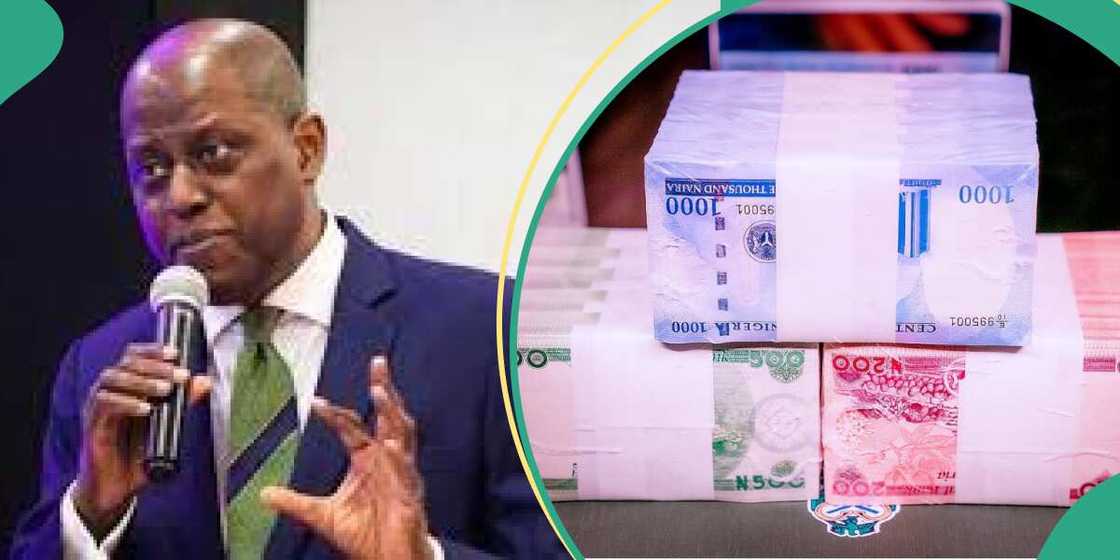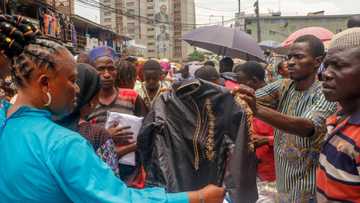Cash Withdrawal Limit, Forex Market Unification, Other Major Decisions CBN Took in 2023
Legit.ng journalist Zainab Iwayemi has over three years of experience covering the Economy, Technology, and Capital Market.
In 2023, many policy directives from the Central Bank of Nigeria (CBN) shaped the lives of citizens and the country in general.
As Nigerians count down to the new year and reflect on the events of 2023, it has become pertinent to factor in some of the economic happenings that impacted the lives of many.

Source: UGC
Being an election year that saw the transition of power from one administration to another, the year 2023 saw a lot of policy changes, additions, and substitutions in the country.
The aftermath of the power transition to the President Bola Tinubu-led administration has seen the CBN active with policy decisions to unbundle the apex bank into one whose primary focus is not diverted from its core monetary role.

Read also
After CBN lifts ban on crypto, analyst identifies winners, names future gatekeepers of industry
Legit.ng provides a flashback of 10 important decisions the CBN took in 2023.
Unification of FX market
In June, the CBN announced changes in the foreign exchange market.
According to a statement by the apex bank, all forex transactions shall now be done through the Investors and Exporters (I&E) window, thereby abolishing the country's parallel and other forex markets.
The development came as the apex bank sought to unify all exchange rates in Nigeria in line with the promise of President Bola Tinubu.
Ban on 43 items lifted
The limitations on foreign exchange that the CBN imposed on importers of 43 commodities eight years ago were finally abolished in October.
This move guarantees that importers can now participate in the Nigerian Foreign Exchange Market to purchase foreign currency for their transactions.

Read also
CBN finally speaks on safety of depositors' funds amid Union, Keystone banks' takeover concerns
The development contrasts the 2015 circular referenced as TED/FEFPC/GEN/O1/010 and its appendices, prohibiting importers from doing so for 43 specific items. 7
Cash withdrawal limit
In December, the CBN directed that all funded accounts without a Bank Verification Number and National Identification Number be restricted, with no further transactions permitted from March 1, 2024.
In a circular to all commercial, merchant, non-interest and payment service banks, other financial institutions, and mobile money operators, the circular ordered banks to place a "Post No Debit or Credit" on any unfunded account.
The CBN stated that the move is part of its effort to promote financial system stability by strengthening the Know Your Customer (KYC) procedures in financial institutions under its purview.
Social media handles to strengthen KYC.
The CBN instructed Nigerian financial institutions, including banks, payment services providers, and international money transfer operators, to display their corporate names on all their online business platforms, which include websites, portals, and mobile apps.

Read also
EIU delivers powerful predictions about naira, others in 2024, lists factors to drive currency
According to the circular, the practice of not displaying the legal name on these online platforms has led to difficulty for some customers needing assistance.
It gave financial institutions until January 31, 2024, to comply or risk facing sanctions.
Contactless payment
In May, the CBN announced that it would issue guidelines for using contactless payment systems in the country.
The guidelines are part of CBN's overall objective to promote the safe and efficient use of cashless payments.
Adeyemi Adefuye, Deputy Director of the Payment System Management Department of the CBN, explained that the guidelines would cover the technical and operational requirements for implementing contactless payment systems and the security measures needed to protect customers' information.
Use of QR code for contactless payment
The Central Bank of Nigeria announced a significant adjustment to the Quick Response (QR) Code Framework, allowing the usage of QR codes for payments in Nigeria to be either merchant-presented or consumer-presented.

Read also
Nigerians attack Multichoice over hike in DStv, GOtv monthly subscription prices for all packages
Before this change, the implementation of QR codes for payments in Nigeria was only based on the Merchant-presented mode (where merchants present the QR Code for buyers to accept to conclude payment transactions).
The CBN stated that the QR code framework was introduced to promote the deployment of an innovative product.
Suspension of processing charges on large deposits
The CBN issued a directive to all commercial banks, financial institutions, and non-banking institutions, suspending the processing fees previously placed on large cash deposits.
The directive affects cash deposits of N500,000 by individuals and N3 million for corporate accounts, which previously affected two and three-percent processing fees, respectively.
The move is a poignant shift in post-Emefiele-led CBN and is a response to the changing financial landscape in Nigeria.
CBN's directive to BDC operators
In August, the CBN restricted the Bureau de Change (BDC) to a certain rate against the official window when buying and selling forex to customers.
According to a circular released, the spread on buying and selling by BDC operators must not exceed -2.5% to +2.5% of the Nigerian Foreign Exchange market window weighted average rate of the previous day.
This means that if the weighted average rate of the official window closes at N700 a dollar, BDCs will only be allowed to sell above N718/$ the next day.
CBN directive on old N200, N500, N1000 notes
The CBN gave orders to banks on the issuance and acceptance of old and new notes in the country.
This is after a report that the apex court ordered that the old notes remain legal tender until necessary facilities are put in place for their replacement.
In line with the Supreme Court's order, the CBN ordered that banks across the country treat the old and redesigned currency as legal tender.
Domiciliary bank accounts

Read also
"A step in the right direction": Obi hails Tinubu over 50 percent slash of interstate fares
In a bid to attract more people into the financial system, the CBN directed banks in June to raise the quality of their products and services.
In a statement, the CBN directed that commercial banks should now allow customers to withdraw up to $10,000 daily from their domiciliary accounts.
Before the changes, withdrawal from a domiciliary account had a limit of $10,000 per month.
Nigerian bank allegedly owned by Emefiele opens up on relationship with Union Bank
Legit.ng earlier reported that Titan Trust Bank reacted to the special investigative report by the Jim Obazee-led panel into the activities of the CBN under Godwin Emefiele.
The panel said there was no fraud in the acquisition of Union Bank.
Obazee submitted the report of his investigation into acquiring Union Bank and Keystone Bank to President Bola Tinubu in two letters dated December 20, 2023.

Read also
FIRS launches digital scheme to include informal sector in Nigeria's tax net, monitor traders
The investigation report had accused the former CBN boss of using fronts to acquire Union Bank for Titan Trust Bank Limited and Keystone Bank without evidence of payment.
PAY ATTENTION: Donate to Legit Charity on Patreon. Your support matters!
Source: Legit.ng



